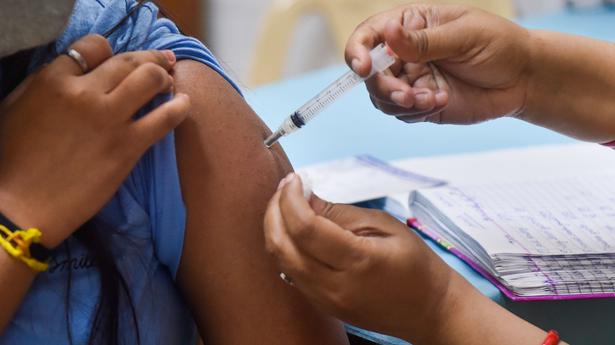
COVID-19 vaccination: Two doses optimal for death protection, say experts
The Hindu
Booster or natural infection will reduce the chance of another infection for just a few months, they say.
India has opened up COVID-19 vaccine booster dose for its 60-plus population while discussion continues on the merits of providing precaution dose to the general population of those over 18 years. Though the government is yet to make any announcement on the issue, experts and doctors are divided on how many booster doses are needed to minimise the negative outcome of the infection.
Booster doses are given with two objectives _ to reduce the chance of getting infection and to reduce the chance of death, in the event of an infection. These two parameters must be seen separately, said Rajeev Jayadevan, vice-chairman, Research Cell, Indian Medical Association, Kerala.
He explained that the first depended on neutralising antibody levels which rapidly declined, while the second depended on T cells and memory B cells, which were long-lasting. “Two years into the pandemic, we are now learning that the umbrella of protection against infection depends on how long ago the most recent infection or vaccine dose was. Thus, whether they get infected or not does not depend only on the vaccine: exposure also plays a role,’’ he said.
He added that whether a person died or not from COVID-19 largely depended on the person‘s age, and how many doses of the boosters were required was a contentious matter.
“Most of the data available in the world are based on mRNA vaccines. The data on deaths show that in people under the age of 65, adding a third dose makes no further reduction in death rates. In other words, the available evidence suggests that two doses are optimal for death protection, while a recent dose of a booster or natural infection will reduce the chance of another infection for just a few months,’’ said Dr. Jayadevan.
A latest study from Israel shows that a fourth dose provides a protection that is of shorter duration than a third dose _ for picking up infection. (Severe disease was already so rare in both groups). This can be called the principle of diminishing returns, as more doses are given after completing the primary vaccination series. What is more important are public health measures to reduce the overall risk of picking up infections. The less the number of infections (especially in older adults) the lower the death numbers will be, say experts.
Advocating multiple booster doses, Gurmeet Singh Chabbra, director Pulmonology, QRG Super Speciality Hospital Faridabad, said: “Multiple booster doses should be considered for COVID-19. I feel every five months booster dose should be considered and the vaccine needs to be modified as per current or existing strain prevalent in that region. Patients who have received Pfizer or Moderna vaccine are entitled for booster dose five months after primary vaccination is complete and those who have received Johnson and Johnson receive a booster dose two months after primary vaccination,” he said.













